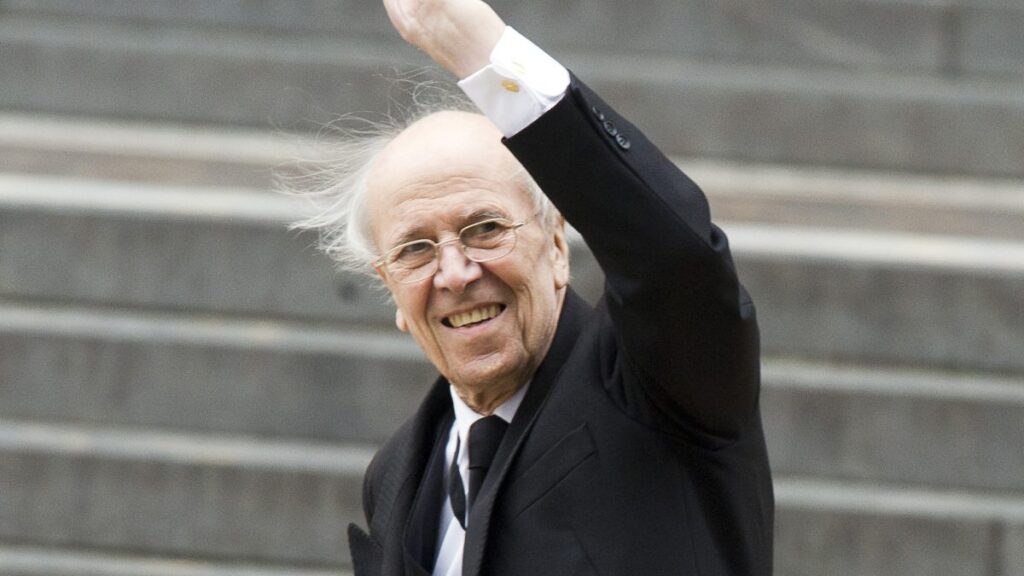If Nigel Farage is often dubbed the godfather of Brexit, then Norman Tebbit can rightly be considered one of its grandparents. Tebbit’s unwavering stance on British sovereignty, particularly his opposition to the 1992 Maastricht Treaty and his support for the “Better Off Out” campaign, laid the groundwork for Brexit and reshaped the UK’s relationship with Europe. Even though his contemporaries in the 1980s could not yet envision a complete exit from the European bloc, Tebbit’s influence was undeniable.
Long after his retirement, Tebbit remained a vocal supporter of right-wing causes within the Conservative Party. He served as the honorary president of the Bow Group think tank and frequently rallied the European Research Group of Tory Brexiteer parliamentarians. His legacy as a staunch advocate for Brexit continued to resonate in the years leading up to the 2016 referendum and beyond.
The Political Bruiser of Thatcherism
During the 1980s, Lord Tebbit earned a reputation as a political enforcer, unafraid of confrontation as he championed the economic and social reforms that defined Thatcherism. He and Margaret Thatcher viewed these changes as a necessary correction to the dominance of trade unions under Labour in the 1970s. Tebbit famously rejected the notion that street violence was a natural response to rising unemployment, stating at a Conservative Party conference, “I grew up in the thirties with an unemployed father. He didn’t riot. He got on his bike and looked for work, and he kept looking till he found it.” The phrase “on yer bike” still echoes in political discourse today.
Labour’s hard-left leader Michael Foot once described Tebbit as a “semi-housetrained polecat” after Tebbit criticized the closed shop system, where professionals were required to join a union. Tebbit later recalled breaking this link as his “greatest achievement in government.”
A Life Marked by Tragedy and Resilience
One of the defining moments of Tebbit’s life occurred in 1984 when he was a victim of the IRA’s bombing of Brighton’s Grand Hotel. The attack, which aimed to assassinate Thatcher and her Cabinet during the Tory party’s annual conference, resulted in five deaths. Tebbit and his wife Margaret were asleep on the second floor when the blast sent their bed crashing two stories down into the hotel’s foyer. While Tebbit sustained broken bones, his wife was left paralyzed. He subsequently left his Cabinet position to care for her.
John Whittingdale, a former Conservative Cabinet minister who served as Tebbit’s special advisor, reflected on the impact of the bombing. “In my view, Norman would have become prime minister, had it not been for Brighton. He was seen as the natural successor to Thatcher. He was by far the most popular person amongst the membership. And I think Thatcher would have been happy at the idea of him taking over from her,” Whittingdale stated. “Brighton was really what changed it, and he felt for the rest of his life a sense of guilt that his wife was disabled because of him.”
The Complex Legacy of a Political Icon
Tebbit’s political persona was multifaceted. Known as the “Chingford skinhead” for his tough-guy image, he was often portrayed as a leather-clad bruiser on the satirical puppet show Spitting Image. Despite this caricature, colleagues noted his courteous demeanor with political opponents. Malcolm Rifkind, who served as Secretary of State for Scotland under Thatcher, remarked, “He didn’t look particularly agreeable, he had very narrow features and looked as if he was in a bad mood all the time and had very strong and unequivocal opinions. That reputation, to some extent, reflected the man himself.”
Rifkind also highlighted Tebbit’s bravery, noting his survival of a near-fatal plane crash during his time in the Royal Air Force. “He was a very, very brave man,” Rifkind added.
Controversial Views and Enduring Influence
Tebbit was a product of his time, often clashing with successors like David Cameron over modernizing agendas. His views on homosexual relationships and immigration were seen as outdated by some. He defended his infamous “cricket test” for immigrants—asking which country they cheer for—until the end of his life. Like his Euroscepticism, his stance on immigration has influenced contemporary debates.
Following Tebbit’s death, there was an outpouring of grief from modern Conservatives, reflecting both a fondness for a mentor and nostalgia for an era of clearer ideological battles. Tebbit, born into a working-class family, rose to become a pugnacious and unbending icon of Thatcher’s capitalist Britain, leaving behind a complex ideological legacy.
 Dog Waste Disposal in Sewers Sparks Legal Warnings in Northern Ireland
Dog Waste Disposal in Sewers Sparks Legal Warnings in Northern Ireland The Salt Path Controversy: Fact, Fiction, and Society’s Insecurities
The Salt Path Controversy: Fact, Fiction, and Society’s Insecurities Starmer Defends Reeves Amid Emotional Commons Moment and Market Jitters
Starmer Defends Reeves Amid Emotional Commons Moment and Market Jitters Rachel Reeves: Tears and Turning Points for the UK Chancellor
Rachel Reeves: Tears and Turning Points for the UK Chancellor Portsmouth Pupils Experience Classical Music with Playground Proms
Portsmouth Pupils Experience Classical Music with Playground Proms